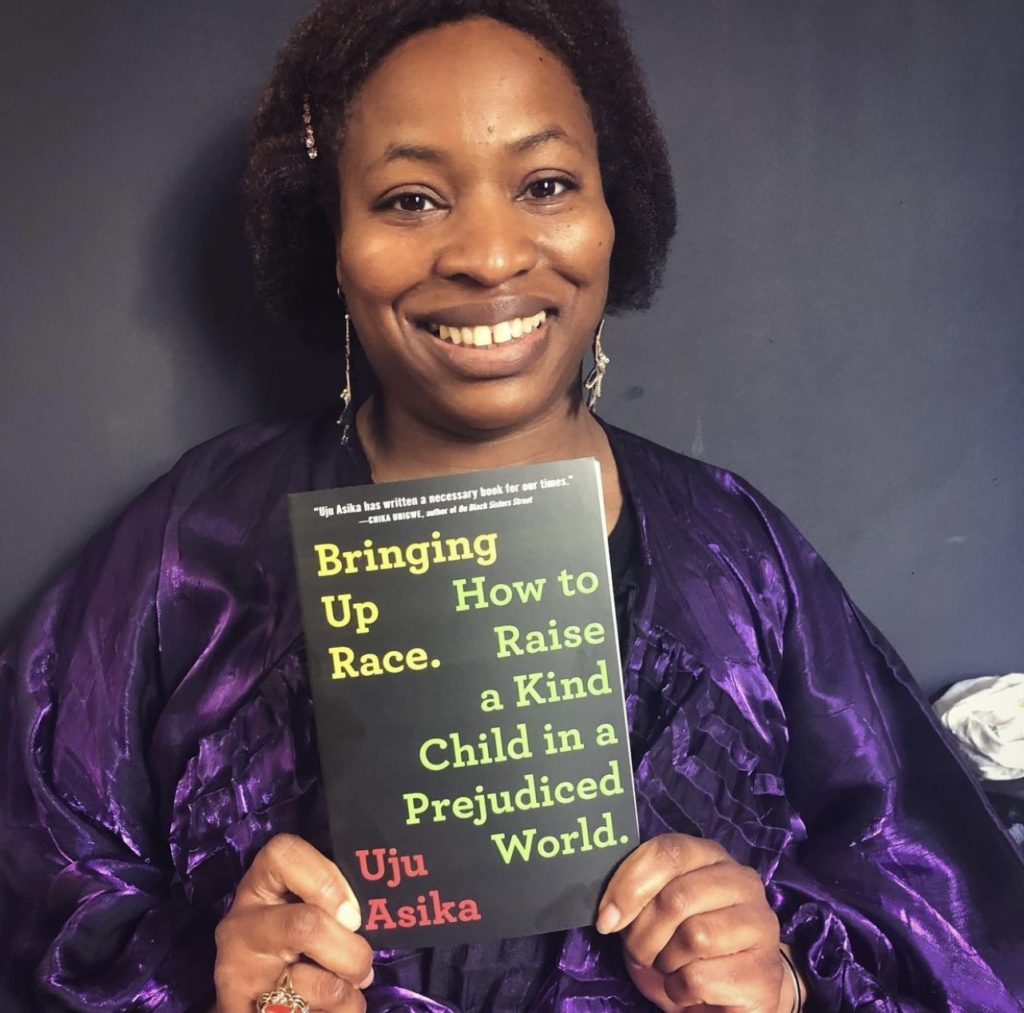
We recently caught up with mom, blogger, and author Uju Asika to talk about her new book, Bringing Up Race: How to Raise a Kind Child in a Prejudiced World. In short, the book offers practical advice and practices to address race and racism for families. If you would like a deeper overview of the book, be sure to check out our review of Uju’s book here.
In this interview Uju talks about the balancing act of being being a parent in today’s world along with her experience going through the writing and publishing process. Uju is a multi-award nominated blogger, screenwriter and creative consultant. She is the founder of family lifestyle blog Babes About Town and you can follow Uju @Babesabouttown on Twitter, Facebook, and Instagram.
Brittle Paper
When did you begin writing Bringing Up Race, and what was the spark?
Uju Asika
I’d say one of the initial sparks was a conversation I had to have with my sons in 2018 after a racist incident in a football match. Someone had thrown a banana at Arsenal player Pierre Emerick Aubameyang and my boys wanted to know what this meant. I was amazed and actually glad that they didn’t understand the connotations yet (they were 9 and 12 at the time). However, it was a reminder that we’d always need to have uncomfortable, even soul-wrenching conversations around race. Because there will always be one more thing.
After I shared that conversation on my Facebook, a relative of mine suggested I should write a book so more people could learn from my experiences. I was extremely resistant to writing a book on race at first. I didn’t want to become ‘that Black woman talking about race’ and the topic was way outside my comfort zone. But I’m so glad I wrote Bringing Up Race because it’s given me the opportunity to get a lot more families talking about this important issue. I started writing towards the end of September 2019 and turned in my first draft just before we went into lockdown in March 2020.
Brittle Paper
This is your first book, and it is brilliant. What has been most surprising about the reception?
Uju Asika
Thank you so much, I’m still glowing from your review. The reception has been so heartwarming, from my very first reader Chika Unigwe to getting starred reviews and people sending me photos with the book from all over — Germany, the US, South Africa. Just the other day, a young boy created a poster of me for Black History Month that went up on his school wall. It moved me to tears. One of the most surprising moments was seeing my name as a clue in a Guardian book quiz, thanks to the brilliant Bernadine Evaristo. My family and I laughed so much when we saw it.
After I announced the book in June 2020, a lot of people spoke about the timing of its release. It was wild coming out with a book on race when the world had suddenly woken up to racism, as if I engineered it. But it felt right, like it was meant to be.
Brittle Paper
Seeing it is your first book, did you have any trepidations going into the conceptualization and drafting process?
Uju Asika
Oh my gosh, it was stressful. The first month or so, I was just flailing around on the page! It was such a huge topic and I’m a big researcher, so I kept going down these rabbit holes. What helped was remembering that I was writing for parents who don’t have the time or patience for my endless rambling. So I focused on telling stories and trying to break down the more complex ideas into something that was accessible and potentially transformative for the reader.
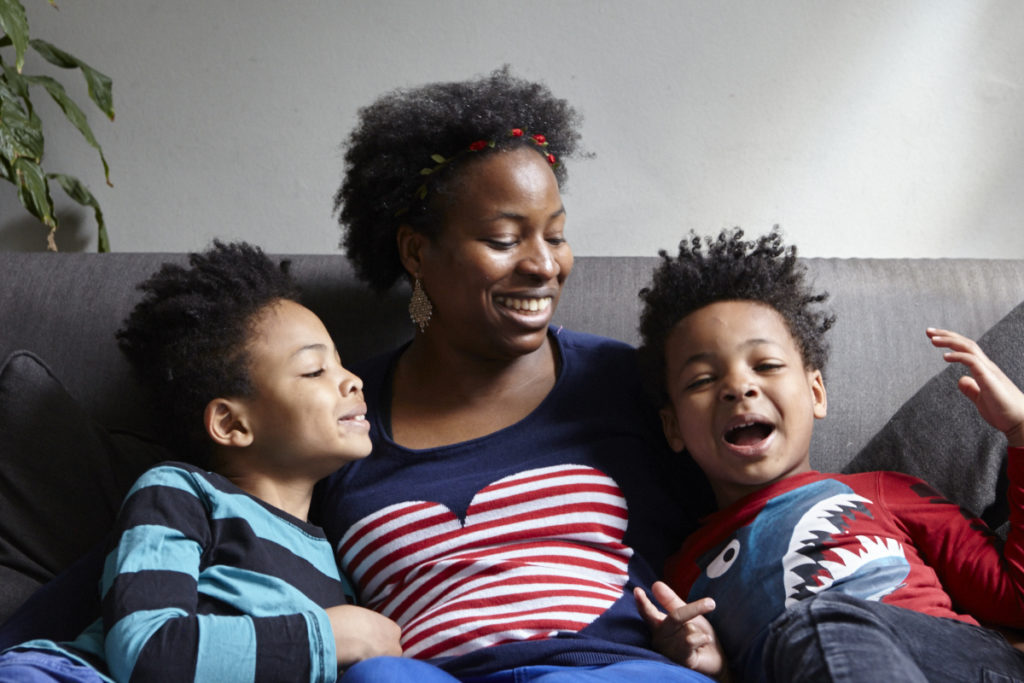
Photo Credit: Natasha Alipour-Faridani (2015)
Brittle Paper
How much of your life as a parent went into creating the book?
Uju Asika
There’s a lot of me and my family in this book, which made me feel quite vulnerable as we edged towards publication. But I think it’s also what people connect to most — the personal element, not just from me but from the 20 or so other parents I interviewed. Their stories are so powerful and relatable. I talk about experiences I’ve had with my kids but also some of my own childhood memories, which were quite painful to dredge up. We carry a lot as Black people in this world, often without really acknowledging it.
Brittle Paper
I remember being shaken to bits by George Floyd’s brutal killing. I was pregnant with my son at the time, so it hit home hard. What was it like for you living in the UK and watching the macabre drama unfold?
Uju Asika
I can’t imagine what it was like for you living in America at the time and pregnant with a son. A few of my interviewees spoke very movingly about the fear and trauma of raising Black boys in the States. The impact was huge in the UK. I think middle Britain was shocked by the outpouring of people onto the streets. Britain likes to think of itself as a ‘tolerant’ and progressive nation, so it was a time of reckoning here too. The Black community were galvanized to push for systemic change and for the first time, it felt like people were listening. Personally, I never watched the video although you couldn’t avoid the images of that officer kneeling on a dying man’s neck. I don’t think any of us will ever forget that.
Brittle Paper
One of the monumental feats of this book is the way it takes into account the many, many forms of racialized experiences. You are right about the fact that racism looks different in various societies. How do you think that approach enriched the work?
Uju Asika
It was really important to me to hear from people of different ethnicities on what race looks like for them. I think it’s one of the standout features of the book. People get stuck on race and racism as a Black or White thing. But race has become part of our human story and if we want to change the narrative, we need to have more voices in the mix.
Brittle Paper
Your definition of intersectionality is one of the best I’ve encountered. In fact, I’ve made a note to use it when I teach my feminism fiction course next year. What advice do you have, more generally, for concretizing abstract ideas (like patriarchy, climate change, etc.) in a way that a child can grasp it?
Uju Asika
I’m so pleased that worked. Sometimes I felt a bit out there with my metaphors and word play! But actually I found it helpful breaking down these concepts into stuff you could explain to a child. As adults, we tend to complicate these issues. Yet it’s really simple and even a child can understand that acting superior to another human, e.g. because of differences in skin/hair/language/gender, is ridiculous and wrong. A child knows that taking someone’s home or property (i.e. colonialism) is not ok. When you’re speaking to a child about a big idea, think about how you can give them a visual image or a relatable experience that will help them grasp what you’re saying. Also ask questions to get them thinking about what’s right and what’s fair. Kids have a natural instinct for fairness.
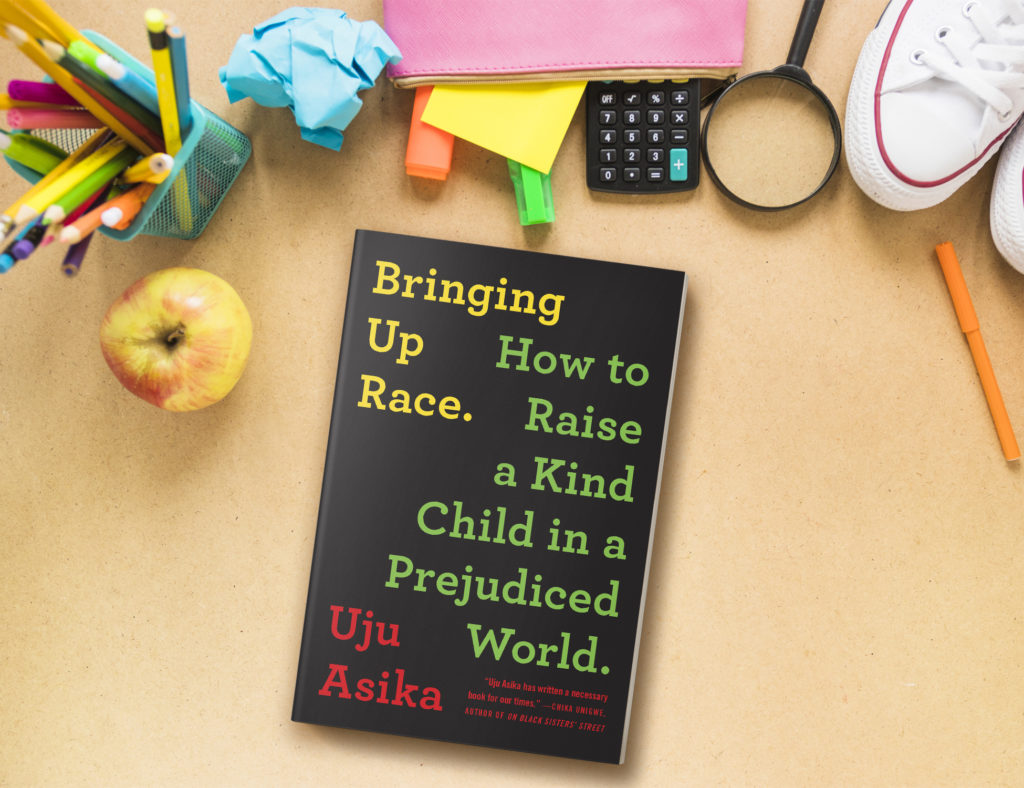
Brittle Paper
Parenting culture is awash with self-help guides. What would you say is different about your book?
Uju Asika
I was determined not to write a standard parenting book. Mainly because I’m not a parenting ‘expert’ in the traditional sense and I’m not a fan of the preachy tone of some of those manuals. So although there are lots of practical tips and research in Bringing Up Race, it’s driven by storytelling. I wanted to write a book that would appeal to you whether you were a parent or not and I think that’s some of the best feedback I’ve had. Many readers who don’t have children have written to let me know how much they enjoyed the book and learned from it too.
Brittle Paper
The book is a guide. Each chapter ends with a Q&A section titled “Talking Points.” I loved that section because after reading a chapter, I had a clear sense of the take-aways. In terms of structuring the book, did you decide to include that early in the drafting process?
Uju Asika
Yes, that came about after my earliest meetings with my UK publisher Yellow Kite. They were happy with my narrative direction but they thought it would be useful to have some takeaways after each chapter. I decided to write them as Q&As based on questions and discussions I’d had with other parents. I actually wound up writing the Talking Points as their own separate chunk and then almost forgot about them. When it came to editing the book, suddenly there were these extra 20k words that I had to fit in! So that was a challenge but it worked out in the end.
Brittle Paper
Let’s talk about your writing. You had a massive following as a blogger long before you published Bringing Up Race. What was it like transitioning from writing as web content and writing in the form of a book?
Uju Asika
I’d been blogging at Babes About Town for almost 10 years when I started writing the book. There were pros and cons because as a blogger, you’re just writing whatever you feel like half the time. You don’t worry so much about stuff like pacing and structure. So I had to be more disciplined. Also I was hyper aware that what I wrote would be in that book forever, unlike blog posts that you could just delete at the end of the day.
On the other hand, blogging is liberating because it helps you develop your voice, which is possibly the most important ingredient for a writer. It allowed me to maintain a very easy, conversational tone that helped pull readers in on a rather heavy and difficult topic. Anyway, I was a writer long before I started blogging. I had been a journalist and I’ve also written for the screen, as well as writing poetry and fiction in my spare time. I’m pretty adaptable.
Brittle Paper
How did the pandemic affect the book? Based on the UK publication date, the book was already in production by the time the pandemic hit. Would you have written anything differently if you had the chance to write during the pandemic?
Uju Asika
I was actually editing the book during the first lockdown. Then after the Black Lives Matter uprising, I made a few small updates to the introduction. I also added the author’s note with reference to the Black Writers Guild which was formed around that time. It’s definitely challenging bringing out your first book in a pandemic. My publication date got shifted a few weeks and I wasn’t able to hold a book launch in person as planned. However, the virtual launch was a wonderful evening, so much love in the room/Zoom.
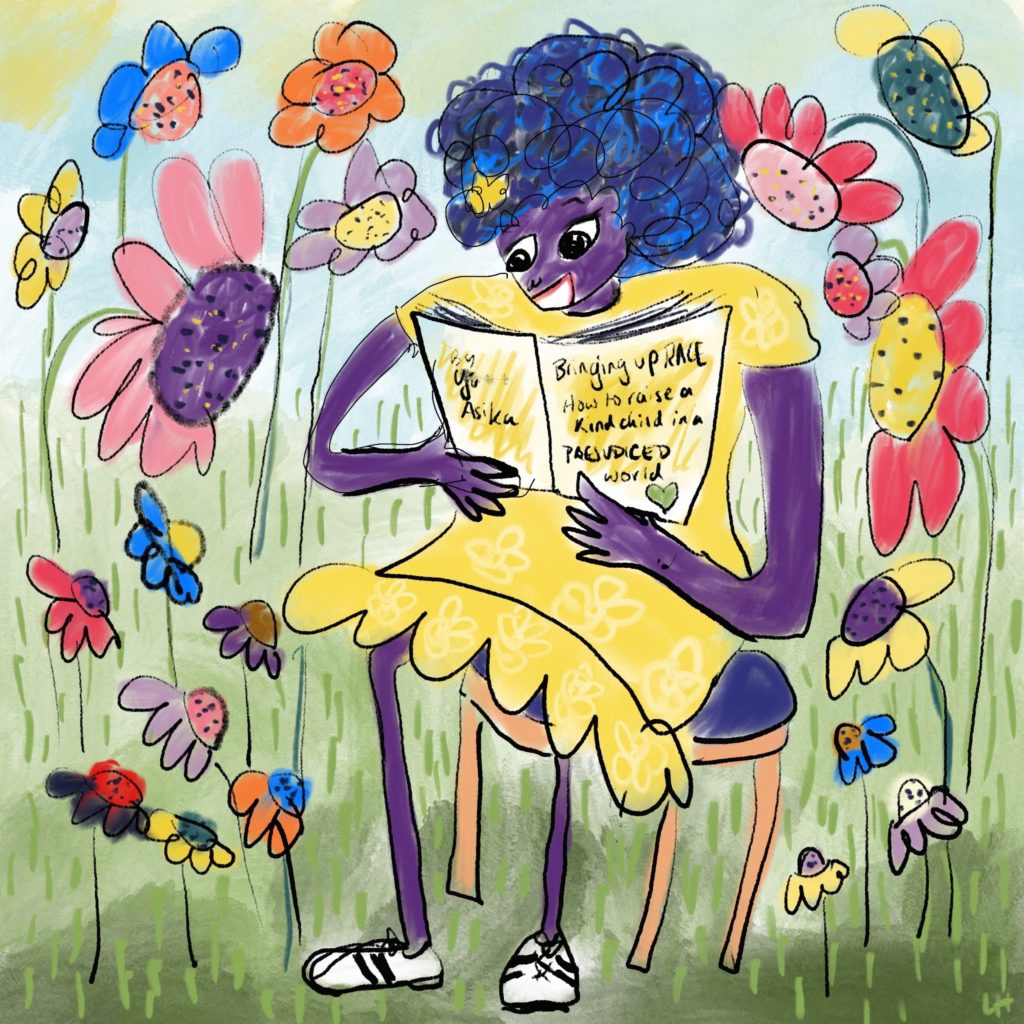
Illustration Credit: Lou Hamilton
Brittle Paper
The next set of questions take us into your life as a reader and thinker. What is the most inspiring book you’ve ever read?
Uju Asika
This is one of those impossible questions. I’m going to say Beloved by Toni Morrison because it’s just a staggering piece of literature in every sense.
Brittle Paper
Who is the greatest influence on your thinking?
Uju Asika
I would have to say my parents. They inspired the title and theme of the final chapter in Bringing Up Race which is “Be Cool, Be Kind, Be You.” It’s one of my life mottos.
Brittle Paper
Where do you go or what do you do in your moments of stillness?
Uju Asika
I read books, listen to music and binge box-sets. I’m an introvert by nature, so some of my happiest times are just sitting in a park on a blanket with my pen and notebook.
Brittle Paper
What are you listening to these days? It could be music, audio books, podcast, anything.
Uju Asika
The last podcast I really enjoyed was Brené Brown’s Unlocking Us with Sarah Niles, who plays Dr Sharon Fieldstone on Ted Lasso. She’s a beautiful human being and it was such an inspiring episode. Music wise, I’m a Prince nut. I also listen to a lot of deep house, old school hip hop and R&B, Afrobeats, some jazz, Latin, alt rock and 80s pop. Music is always playing in our home.
Brittle Paper
If only one book could survive the apocalypse and you held the power to decide, which book would you pick? We know it’s an utterly ridiculous question, but humor us!
Uju Asika
100 Years of Solitude because that book changes lives. I know it changed mine.
Brittle Paper
Brittle Paper readers are always looking for book recommendations. Have you read anything exciting of late?
Uju Asika
Three Women by Lisa Taddeo blew me away and now I can’t wait to read The Sex Lives of African Women. Homegoing by Yaa Gyasi should be essential reading. I also really loved Luster by Raven Leilani and I’m about to crack into Wahala by Nikki May. It sounds so juicy. The last book I read was Crying In H Mart by Michelle Zauner. I hadn’t actually heard of Japanese Breakfast who is the author’s pop star alter ego, but I added her to my playlist immediately after reading. It’s a gorgeous memoir about loss and cultural identity. Her descriptions of Korean food are mouthwatering.
Thank you Uju for taking the time to chat with us!


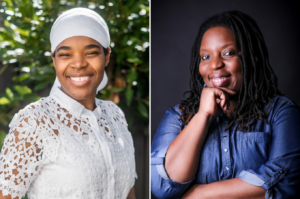

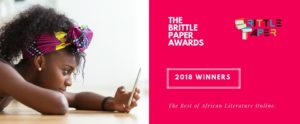



COMMENTS -
Reader Interactions